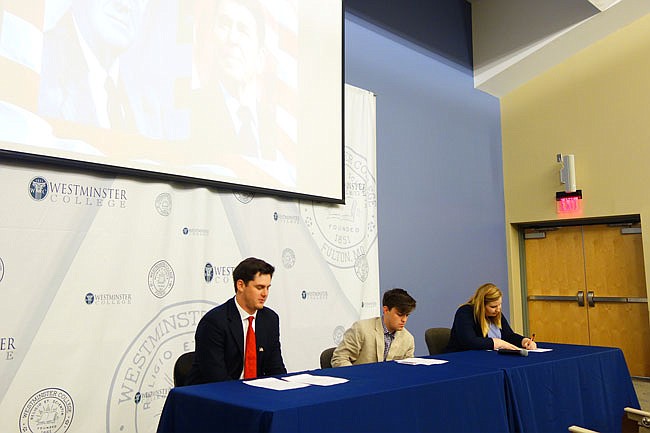Ronald Reagan and Franklin D. Roosevelt were tied one-for-one after their first set of debates Wednesday morning.
That is, the students who played them were. Westminster College political science and history students in a class co-taught by professors Mark Boulton and Tobias Gibson channeled the two former presidents for a series of mock debates.
"In some ways, these presidents represent the epitome of conservatism and liberalism in the 20th century," Boulton said of the presidents.
Students spent the semester poring over biographies, speeches and other works. They used the presidents' own words to form the answers and rebuttals to the debate questions Wednesday.
"The opening and closing statements are mine, based on what I know about Reagan and how he talks, but the rest was all him," Ryan Klimkiewicz said.
The first two debates focused on economic and social policies - two areas where the presidents' views vastly differed. In the wake of the Great Depression, Roosevelt favored a robust social safety net; Reagan, strong capitalism and a reduced federal government.
Michael Cermak said that forming specific answers to the questions required some deep-delving research into the policies and legislature Roosevelt promoted.
"(And) going online, trying to figure out how (the presidents) speak in general," he added.
The professors noted the difference between the style of speech and debate used by both Reagan and Roosevelt and the current political discourse.
"These students came to political awareness during the 2016 election, and I fear for them because of it," Boulton said. "When you see how bad things got in terms of rhetoric and name-calling they need to know there's another model out there."
Student participants said they chose their words and tone with care.
"In 2016, those debates got more personal," Missy Rolseth said.
"I just wanted to be respectful," Cermak added. "I tried to give good points in return, but one party (is not) more right than the other - you need both."
Gibson said he hopes the students have learned something from their close look into the two presidents' leadership styles.
"You can appreciate how both of them (have left an impact) in society," Rolseth said.

